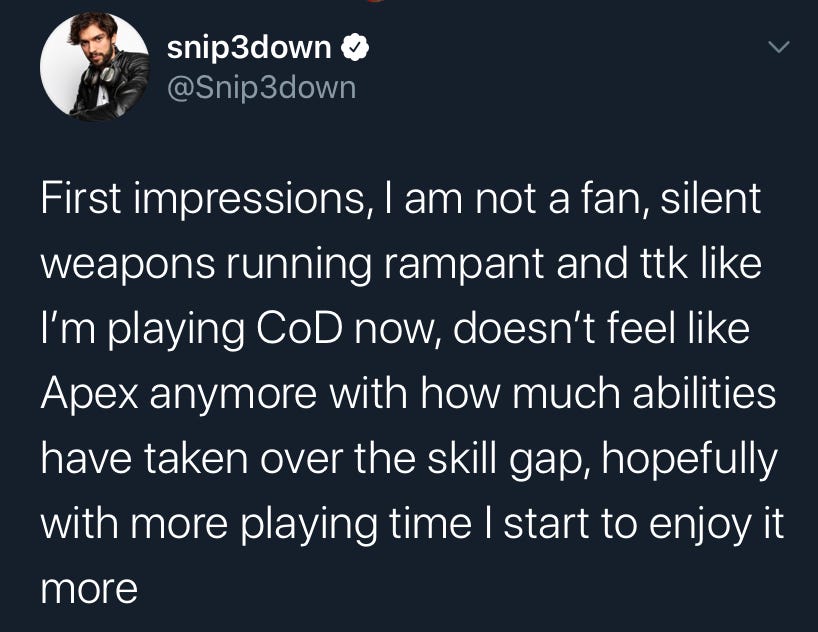First time here? Subscribe to The Final Circle below and get high-quality Apex news and analysis delivered directly to your inbox.
New season, new gripes
Season 6 of Apex has dropped. We got a new legend, a new SMG (press F to pay respects to the ground loot R-99), a new energy weapon meta, and a new crafting mechanic.

But players who’ve already jumped into Season 6 are arguing about a totally different topic for a change—time to kill. Time to kill (TTK) is exactly what it sounds like: how long it takes to kill another player. It’s one of the most fundamental elements of competitive shooters, best explained by two titans of the genre with vastly different approaches to the mechanic: Halo and Call of Duty.
Halo is the gold standard of a shooter with a long TTK. The self-healing, highly protective armor that’s the hallmark of the series means that in PVP, players have to do consistent damage over a relatively long period of time to kill other players. If someone escapes behind cover during an engagement, the shield auto-regenerates after a few seconds, resetting the fight and forcing both players to begin again, usually with a similar amount of total health.

Call of Duty, on the other hand, has historically employed an extremely low TTK. Engagements between players are quick, and if someone isn’t dead after a couple of seconds in a one-on-one, the fight’s probably not going well. Even in CoD: Warzone, a battle royale that uses a plate armor system that allows for some in-fight healing, the TTK is still fairly quick: single headshots down enemies, and one-clipping opponents is the norm.
Halo and Call of Duty have a completely different ‘feel’ from each other, and the vastly different TTK is a big part of that.


With the launch of season 6, Apex has noticeably tweaked its TTK, even referring to it by name in the patch notes. It’s not the first big online multiplayer game to make a balance change like this. Destiny 2 reduced its TTK way back in 2018 when serious PVP players complained it was too high, and Battlefield 5 tinkered with TTK freely: reducing it, increasing it, reducing it again after an overwhelmingly negative fan reaction, and then increasing it again.
In those games, the communities seemed to strongly believe that a lower TTK led to more skill-based gunplay. But the issue is far from clear. Like the aim assist debate, TTK can be argued about endlessly, and there are compelling cases on both sides of the slider. A high TTK, for instance, gives highly-skilled players a longer window of opportunity to dominate engagements. If they’re ambushed or have bad positioning, the high TTK allows them to escape, heal, and counterattack from stronger positioning—and with better movement and aim they’re likely to win subsequent engagements.
In high TTK games, the most skilled players lose those types of encounters less frequently. In low TTK games, skilled players still dominate, but if they’re ambushed, sniped, or otherwise surprised, they’re usually killed before they can escape. Engagements are so quick that good players can die before they’re able to leverage superior mechanical skills to turn the fight in their favor.
‘Strategic positioning’
The TTK discussion in Apex so far has been interesting, but the change raises more fundamental issues about the future of the game and its identity that haven’t really been discussed as much as they should be.


One is that, if the past is any indication of the future, confident developers working on games with healthy multiplayer scenes don’t tend to tweak TTK. Fortnite’s TTK, for instance, is on the long side, and its engagements tend toward creative uses of movement and cover over time. These fights are long but suspenseful, and highly strategic.
If it ain’t broke, devs don’t fix it. Battlefield 5 was clearly struggling to retain players when it tweaked TTK again and again (and again), and Destiny 2 went through its own issues with player retention.
In the Apex patch notes quoted above, we see some really interesting language— “to better reward strategic positioning.” Positioning in games like CS:GO and Valorant is everything. Ideally you’ve killed your opponent before they know where you are. In a battle royale with an incredibly large map like Apex, it’s more difficult to secure foolproof positioning. Great pro teams often end up in bad positions and need to dominate team fights to escape from them. Spots behind what appears to be solid cover can turn into a killing field if another team gets an unexpected angle.
More generally, a focus on rewarding “strategic positioning” rather than “creative use of abilities”, “mechanical skill”, or “strong team coordination” is evidence that the devs are trying a different approach to the game—something that fills me with a mixture of dread and hope.
Server issues

A lower TTK also has a huge impact on what players perceive as fairness in online play. We are still a long way from any hope of LAN tournaments for the pro scene, and the server issues endemic in Apex since its release will make low-TTK combat feel less fair for all of us. Expect to get downed from behind corners far more often, or long after you peek over cover—a high TTK was one of the qualities that made Apex bearable to play on laggy servers with low tick rate.

Meanwhile, in CoD
In other news, Call of Duty League’s postseason was announced with a $4.6 million dollar purse. I wonder how tall we could stack the ALGS Super Regional Playoffs prize pool of $388,000… could be at least one Statue of Liberty, but no skyscraper this year.

Did you like The Final Circle? Subscribe to get weekly emails, share it with your friends, or go follow my brand-new Twitter account @UR_Scrubb




I’ve been able to get behind all the other updates on Apex, even the ones I didn’t like, just because I loved the game. But this TTK change has gone so far if for nothing more than the fact that in 1v2, 1v3, or 2v3 situations, you will now lose those fights more frequently than you did before, even if you are the better player mechanically speaking. And how many times in Apex is a player in a 1v2 or 1v3 situation? Very, very often.